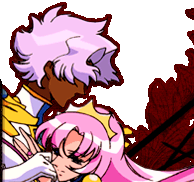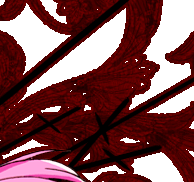
This analysis
was donated by Clarice. Page 1 +++ Page 2
 The Fire At "Nemuro Memorial Hall" and the Coffins Beneath The infamous fire. It is safe to assume that perhaps the hundred boys did die in this fire, but the exact manner of their deaths is unclear. It seems that perhaps they were in fact buried alive; Miki Kaoru mentions that there is a rumour of that nature going around about Nemuro Memorial Hall. Mikage himself tells Utena that the one hundred boys who died in the fire were trapped in the building and burned to death.
Perhaps it is more likely that they were trapped in their coffins and suffocated as the building burned down….indeed, in the first episode of this Arc, Kanae hears distinct knocking from inside the coffins. It as if they, too, are trying to escape the cruel fate but are shuttered away into these coffins, coffins they were locked into by their contract with the Ends of the World, their mysterious “You Know Who.”
The major symbol of the tomb beneath Nemuro Memorial Hall is of course these coffins themselves. Later on in the series, Kyouichi Saionji makes the bold statement that they (the present Duellists of the Academy) are all still in the coffins that the Ends of the Worlds made for them – and indeed, in Professor Nemuro’s case, this seems very much true. Throughout the time he is working under Akio without being fully aware of the fact, he is haunted by the sound of the boys pushing long, white-shrouded boxes around the hall. It isn’t until he sees Tokiko kissing Akio that he finally sees that they are in fact coffins. It is a very unsubtle hint that Nemuro took to burn the place to the ground…as much as one can burn stone to the ground, at any rate. What is most unsettling about these coffins, however, is that it appears that Nemuro has a coffin himself…in his duel, we are shown a brief picture of Nemuro pushing a coffin forward. Of course, this may indicate that Nemuro started pushing the coffins around himself to speed up the process so he could bring death to all the boys, but it seems more that Nemuro was building his own prison, his own eternity in a coffin…imprisoning himself in his own memories, much as Anthy Himemiya is imprisoned in her own coffin. Is this perhaps an indication that Nemuro is dead…?
The missing shoes in the “morgue” are perhaps only circumstantial, but it is possible that they symbolise something to do with the question of Nemuro’s mortality. The shoes are all lined up beneath the coffins set into the room – which Mikage claims leads to the Ends of the World – and Mikage himself stands amongst them. Whether Mikage is alive or not is difficult to pinpoint exactly. He seems to have his place among the dead of the Hall, but unlike the hundred dead boys, he does not hold a black Rose Signet. His is white, the same colour of those of the living duellists of the Academy. It is apparent that Mikage is alive, but at the end of the Arc, Akio claims that Mikage was more or less a figment of his imagination, a spectre kept alive and functioning only through the manipulations of memory and former desire.
The fire itself is another highly complicated incident in this arc. There are two different interpretations one can make from it – the first is that Mamiya burnt the place down as part of his unexplained change of heart, because, as he told Professor Nemuro, “I... I... I want eternity.” This is the explanation we are first led to believe; it is not until later that we come to understand that it was Professor Nemuro who burnt the place down…and the ill-conceived memory that Mamiya did was something that Akio gave Mikage to prevent him from being overwhelmed by guilt at having been the one to murder all those boys.
It is clear to us at the end of the series that the fire itself was in fact completely unnecessary; technically, Akio had no need for the sacrifice he insisted to Professor Nemuro was required. After all, Professor Nemuro did not make the Duel Arena appear, nor the road to it, nor the castle said to hold eternity – all are mere projections from Akio’s Observatory that never really existed. The demand that Akio placed on Nemuro seemed merely for the point of testing Nemuro’s devotion towards Mamiya…for what Akio really needed was a person to have something they desperately wanted to cling to. Nemuro’s memory of Tokiko and desire to save Mamiya seemed to be exactly what Akio needed to manipulate the “puppet master” he would make of Souji Mikage.
The symbols of the Black Rose Arc are deeply tied up with the experiences and the fate of Professor Nemuro himself, which is why they are so important in the end. Professor Nemuro, in the short time he spent at Ohtori Academy – a short time soon to feel as if it were an eternity – made for himself a precise coffin, one built by the Ends of the World to his specifications. However, the memories would not stay hidden; when the snow melted, they rose again…and these roses were not the same as the bulbs that had been planted. The “God” of the Academy and his attendant Bride saw to that. ‘”That corpse you planted last year in your garden,
‘Has it begun to sprout? Will it bloom this year?
‘Or has the sudden frost disturbed its bed?
‘Oh, keep the Dog far hence, that’s friend to men,
‘Or with his nails he’ll dig it up again!
‘You! Hypocrite lecteur!—mon semblable,— mon frère!’”
 Shantih shantih shantih Tokiko, Nemuro and Mamiya
‘The peace that passeth understanding.’
The relationship between these three is in fact fairly simple to explain from the point of view of Professor Nemuro himself, less so from the viewpoints of Tokiko and Mamiya Chida. What happened to Professor Nemuro upon meeting these two was something that turned his life around. He was shown a beautiful woman and her ailing brother, and led to believe that he could take the third place in their lives; the place of surrogate “father” and older brother to Mamiya, and the role of lover, friend and confidant to Tokiko.
This was a family Nemuro believed in his heart he could be a part of, and very much desired to be a part of it. His attitude towards Tokiko is obviously that of a man in love; he treats Mamiya as a son, a younger brother. While Tokiko seems unaware of Nemuro’s interest in her, it seems that Mamiya is almost painfully aware of it. He tries to assure Nemuro of his sister’s potential interest – “My sister came to Ohtori Academy to meet you.” – and tries to put in good words for the Professor. “I'll be sure to tell my sister that you’re worried about me.”
But what does the woman herself feel for Nemuro? Tokiko is perhaps interested in Professor Nemuro, though it is never entirely clear. Her questions as to his marital status as suggestive – “Is there someone important in your life? Or perhaps those people known as geniuses never fall in love with other people?” – but her later words as an elder woman that same episode may indicate otherwise. She watches the shadow play that tells us of Nemuro’s resemblance to a robot that mechanically carries out its duties without emotion nor drive and remarks “But those who look at you get lonely.” This may be trying to say that Tokiko was concerned for Professor Nemuro, and thought that he needed love in his life, but not necessarily any love she herself could give him. Was it pity that made her ask him if he had ever fallen in love, or was it her own interest in him?
Mamiya’s attitude towards Professor Nemuro seems to be that of a younger man to an elder. He states clearly that he respects Professor Nemuro, has even read his thesis – it appears the pair are both precociously intelligent for their respective ages. Given that Mamiya is trying to set Nemuro up with his sister, it must be that he likes him as a person. One could say that Mamiya is expecting to die soon and so presses Nemuro and Tokiko together so his sister would not be alone when he inevitably died. This “sempai” relationship of a younger boy being respectful to his superior is perhaps the most accurate interpretation of their relationship. Mamiya obviously has nothing against Professor Nemuro as a person and actively encourages his desire to be with his sister.
This is the family Nemuro wishes to be a part of – the family the Academy has opened his eyes to. He looks to them and sees a peculiar peace he never knew before, and finally understands what he thinks is the nature of love, affection…it is only when he sees this dream slipping out of his fingers that he groped his way blindly forward, only to discover that the path before him had been prepared in a most horrific manner…
 Mixing Memory and Desire: Mikage and Mamiya
‘By this, and this only, have we existed
Which is not to be found in our obituaries
Or in memories draped by the beneficent spider
Or under seals broken by the lean solicitor
In our empty rooms’
Souji Mikage and Mamiya Chida had between them a very different relationship during the “present” of the Black Rose Arc. In fact, at the beginning, there were distinct undertones of a relationship that had a great deal to it, more than mere friendship. It is indeed obvious that the relationship is far different that what was between the two in the hazy past.
Mikage makes several comments during the series that would lead anybody to believe that he feels for his “ward” more than something strictly platonic; he tells Mamiya he will make of him “a real bride,” he tells Mamiya he is “beautiful,” teases him gently that Mamiya pricked his own finger purposely to have Mikage suck the poison from his fingertip. And indeed, there is even the comment of the secretary in episode 23: “But the person I fell in love with wasn’t a boy younger than me, like you.” The sentence can be taken in a manner that is indicative of the relationship between Mamiya and Mikage, that Mikage is making little secret of his affection for Mamiya. He does, after all, have a picture displayed of the young man on his desk.
Mikage and Mamiya, despite never being shown to actually have anything more than a friendship between them, still have a camaraderie tinged by the thought of love. This is not what was apparent between Mamiya – the real Mamiya – and Professor Nemuro, however. Mikage, the living embodiment of Nemuro’s tampered with memories, has had his perceptions warped. The memories that “stopped his own time” are not in fact the true memories. And it is in this way that memory and desire have been swirled together in Akio’s peculiar garden.
Mikage’s attitude towards Tokiko is very different at the end of the Black Rose Arc; he walks past her without acknowledgement in a hallway, and when he thinks that Utena is Tokiko, come back to punish him for the “accident” at the Hall where Nemuro Memorial Hall now stands, he is exceptionally hostile towards her. Yet, he is forever gentle towards Mamiya. The memory of Mamiya and the desire Nemuro had for Tokiko seemed to have been pushed together in Mikage’s mind, concentrated into one thing towards one person – the Mamiya we see in the Black Rose Arc. Mikage seems to be rebuilding the family Nemuro thought he could once have with Tokiko and Mamiya Chida, but this family consists of only Mikage and Mamiya, hence the change in the relationship. Mamiya is both son and lover in this case.
Mamiya and Mikage have a very unusual twist on their earlier relationship…and it is an indication of the differences between Nemuro and Mikage to have this demonstrated to us in such a way. It very much fits in with Akio’s very sexual manner of manipulating those about him as part of his grand plan to regain the Power of Dios. While he does not manipulate Mikage in an obvious sexual way as he did with so many others – Anthy, Kanae, Kanae’s mother, Touga, Utena, to name just a few – he does so vicariously through Anthy, who plays the false Mamiya to Nemuro’s Mikage. It becomes clearer that Mikage is perhaps the darker side of Nemuro – is it only a game of Dr Jekyll and Mr Hyde…?
 Ash Wednesday: Nemuro and Mikage
‘Because I know that time is always time
And place is always and only place
And what is actual is actual only for one time
And only for one place.’
As has been stated earlier, Professor Nemuro and Souji Mikage are the same person. However, each is a distinct personality due to their time in the story and their interactions with the characters.
Nemuro’s personality is obviously very different – Nemuro’s personality is symbolised quite accurately by the snow about the academy, the snow that does not disappear so easily. Nemuro is shown to be a computer-like man who breaks his programming; the snow is melted by the first sparks of genuine passion he has felt. This passion is reflected in his work, and is noted by those about him. Mikage’s personality is a different story. He is the apparent puppet master of the Arc, though he is dethroned by the end. Mikage’s attitude is one of cool intellect and reserve, but he also has a way of manipulating people by subtle sensuousness. This can be seen in his dealings with people such as Nanami, Miki and Saionji; he has a manner of talking that is suggestive, low and lends itself to tones of manipulation. Nemuro never spoke in that particular manner. He behaves similarly to those in his elevator – but notice one of Mikage’s characteristic lines: “The path before you has been prepared. I suppose you have no choice to revolutionise the world.”
While Nemuro was in love with Tokiko, and fatherly towards Mamiya, Mikage is a different story altogether. He has an apparent interest in Mamiya that has almost sexual overtones, though nothing is ever aptly demonstrated to us to ascertain this for sure. Nemuro was in love with Tokiko, while Mikage is dismissive and outright hostile towards Tokiko and his memories of her. However, while Mikage was subtly different from Nemuro – he was able to manipulate people as the puppet-master without qualm, while it is questionable whether or not Nemuro could have done the same thing – the two are tied together by shared memories, though Nemuro has a different recall to Mikage.
One other interesting difference between the two is in fact Professor Nemuro’s glasses. He wears tinted purple glasses – which he appears to actually need to see, given he is rarely without them, and the only time he is seen without them on, he needs to put them back on again to see Akio properly and to read the letter – while Mikage does not at all. Why is this? It is never said…but there is a memory relating to this. When Tokiko discovered Nemuro had set the fire, she slapped him. Hard. She knocked his glasses to the ground, completely stunning Nemuro, who must have expected her to be grateful for the fact that he was saving her brother’s life. This is perhaps part of the transition between Nemuro and Mikage…upon realising he cannot have Tokiko at all – that slap was a pretty good indication – he leans forever closer to the darker side of himself, the shadow known as Souji Mikage.
Another way of looking at this is to consider one of Mikage’s lines; this particular line seems to weave together the two viewpoints of the two personalities of the one man. He begins by saying “The modest scent from a single rose isn't bad...but I'm attracted to the fragrance of many roses too.” This line could be taken as saying that while Nemuro would have been interested in Tokiko alone, what really had him hook line and sinker was the addition of Mamiya. It is a family that he wants. However, the line is completed with “There's a tense atmosphere of mutual competition, you see.” This is perhaps indicating Mikage’s differing perception of his relationship with Mamiya, that Tokiko and Mamiya were in fact competing for his affections. While this reflects on the change of the relationship between Mikage and Mamiya as opposed to the relationship between the Nemuro and the young man, it probably doesn’t indicate much to us about what Mamiya and Tokiko truly felt towards the Professor. After all, Mikage’s perception of these things is hardly to be taken as accurate.
As it is finally, Souji Mikage actually appears to be one of the three “graduates” of Ohtori Academy. Only two other students leave the Academy directly; Ruka Tsuchiya and Utena Tenjou, though Ruka is perhaps debatable. Ruka leaves the Academy through death, as such; but then, one can never be sure if Mikage or Nemuro actually existed outside the Academy either.
However, what links the three “graduates” is the fact that each of them appeared to set someone free. Utena obviously releases Anthy from her coffin, which is where she had imprisoned herself to further her brother’s desire for the Power of Dios. Ruka releases Juri Arisugawa from the metaphorical chains – the physical locket – of the unhealthy love/obsession the Duellist had for Shiori Takatsuki. Mikage was slightly different…Mikage appears to set Professor Nemuro free from his memories.
The final duel of the Black Rose Arc is of Utena Tenjou and Souji Mikage, with the aptly named duel song I Am An Imaginary Living Being. Mikage is challenged by Utena on the basis that Utena wants to kick his ass for manipulating innocent students – it is obvious she knew nothing of his true intentions. Mikage is, at this point, highly delusional; he is seeing Utena as Tokiko. He fights desperately so that he can grasp eternity for Mamiya, all the while insisting to Utena that the pair of them are just the same. The symbol that is upon the desks of the hundred youth sacrificed for eternity?
A photograph of Mamiya and Tokiko, the two people who changed his life so long ago…just as Dios had changed Utena’s. It is the reflection of one of Mikage’s most memorable, eloquent lines: “Only those with beautiful memories are allowed to wish, ‘If only those days could last forever, if only I could still be what I was back then.’” Indeed, Mikage is trapped by the memories he can not bear to lose – and it is losing the false sheen of those beautiful memories that leads to the disintegration of his manipulated mind.
As the duel progresses, a voice speaks to Mikage, a voice unheard by the others in the duel arena. It is the voice of the unseen Mamiya…and it is when this voice speaks to him that a terrible realisation hits Mikage…the voice is perhaps the real Mamiya…and the photograph reflects this. Mikage’s perception is altered dramatically and suddenly, and the viewer shares his epiphany. The Mamiya he has spent the Arc associating with is not the real Mamiya, and the real Mamiya is dead. It is here that Mikage is shown at his moment of psychological disaster. He not only has to try and figure out who the boy he has been plotting with truly is, he must cope with the fact that the true Mamiya is dead.
The situation grows progressively worse as Mikage is finally able to recall the truth. Mamiya did not burn down the Hall; he himself did, and was condemned by Tokiko, the woman he loved and did it for, because of these actions. This naturally shatters the man, and leaves him more than open to Utena’s attack…his rose is scattered, and all we hear of Mikage again is a phone call. One last phone call to the true puppet master…
What Akio tells Nemuro over the telephone after Mikage loses the duel is that, through the memories he clung to, the memories of Tokiko and Mamiya, he stopped his own time. “The period where you hid the possibility in your heart, not growing up, was useful.” It is apparent to us at this point that Mikage has reverted back to Nemuro fully…because his memories were quickened. Whether it was by Anthy-Mamiya or the real Mamiya is debatable, but it illustrates the key difference between Mikage and Nemuro. Nemuro was the true form; Mikage was the Black Rose Duellist form of the Professor. Like the other black Rose Duellists when they lost their duels, Nemuro “woke up” from his controlled, manipulated Mikage body and became himself as he remembered what had really happened…and was consequently asked to leave the Academy. And as soon as he did, all save Anthy and Akio forgot he had been there at that time…so what was the purpose of a time the Academy forgot?
There is, however, one slight problem with the definition of who Mikage was – and that is of course to do with Akio’s later claim that even Mikage himself was a figment of his own imagination.
 The Dream-crossed Twilight Between Birth and Dying: Conclusion
‘Pray for us sinners now and at the hour of our death
Pray for us now and at the hour of our death.’ What was the intention and the purpose of the Black Rose Arc?
There are several ways of taking the Black Rose Saga. Firstly, its most obvious characteristic is that it is acting as a mirror for the end of the series. When Mikage loses his duel and leaves the Academy, we are shown exactly what happens when a duellist fails and leaves the Academy. This indicates at the end to us what will happen after Utena has left – that everyone save Anthy and Akio will forget exactly what she had done while at the Academy, as everyone forgot Mikage – but it also serves to illustrate that Utena has brought about a girl’s revolution.
When Mikage leaves the Academy, the duels continue on as if nothing has ever happened. Mikage had failed to change the course of the road towards eternity. Utena, however, releases Anthy from her destiny as the Rose Bride and the duels, as a consequence, can not continue. This difference between the two endings for these two Duellists indicates that Utena has indeed brought about the Revolution, whether or not she actually knew it herself.
As for Mikage and Utena, the pair were very similar themselves. Superficially, they looked similar; both had their respective “Brides,” and both seemed to be fighting for them. Utena was more orientated towards setting Anthy free from being the Rose Bride, however, while Mikage wanted to make Mamiya the Rose Bride and make him eternal. Here the question can be asked “Did Mikage actually ever KNOW what the “eternity” of the Rose Bride actually was?” but that is perhaps not the point. Both Mikage and Utena are clinging to the memories of their pasts; it is what they remember that shapes who they are in the present.
“I know that you’re the same as myself.” It is a line Mikage repeats to Utena in numerous forms, and it appears to be true. “Your eyes are like those people who can’t help wanting to make memories last forever.” Both Utena and Mikage are trapped by their memories, and the pair have their memories manipulated by Akio for his own ends. Even though Utena insists she is different to him – the reason she challenges him to a duel is “I’ll beat you to a pulp and prove that I’m different from you!” – she is in fact very similar. As Mikage states “Anyone who stands here is the same as myself. They come lured by eternity.” Both Professor Nemuro and Utena wanted to see eternity – Utena to prove that there was a point to living, Nemuro to forge a proper family for himself, Tokiko and Mamiya. The pair are indeed alike in many ways, but they are not the same. The Black Rose Arc and Mikage’s fate acts as a darker mirror to Utena’s eventual fate, indicating to us what happens first when the Duellist fails, and secondly, when the Duellist succeeds in their quest.
This point is further illustrated when Mikage says to Utena “For you, it’s possible to make the memory last forever, just like I did.” The obvious fact is that Utena brings about her ‘shoujo kakumei,’ the girl revolution while Mikage does not change anything despite the fact that the two of them started from the same gateway. Despite all their inherent similarities, despite the path being prepared before them by the same man, Utena and Professor Nemuro’s destinies diverged. Nemuro became Mikage and made his memories last forever, effectively imprisoning himself in the Academy. Utena had the opportunity to become trapped in Akio’s world by way of her memories of her Prince, but she did not – she used her memory to bring about the revolution. That is one of the key differences between Utena and Nemuro, and it illustrates to us that Utena did bring about the revolution.
The Black Rose Arc can also be seen as a training ground for Utena; Akio’s main purpose in having a Duellist as Victor was to in fact forge a sword that would be “noble” enough to break the mesh of thorns that covered the Rose Gate (which blocked it to any entrance and sealed the Power of Dios). By having Utena duel people for the life of her “Bride,” Anthy, and for the salvation of her friends and schoolmates – Kanae Ohtori, Kozue Kaoru, Shiori Takatsuki, Mitsuru Tsuwabuki, Wakaba Shinohara, Keiko Sonoda – she would theoretically be improving her skill and her noble heart. One could say that Mikage was there because Akio wanted to strengthen Utena’s noble spirit (which Dios admonished her to never relinquish) before having her fight the final duels that would led her towards the duel called Revolution.
In the end, the Black Rose Arc is indeed one of the more peculiar aspects of the show. It is the “forgotten” Arc that may appear to have no impact on the final outcome, but in the end it is obvious that it does. It illustrates to us things about the characters we did not know before – Keiko’s reason for being Nanami Kiryuu’s “friend,” Kyouichi Saionji’s “other self” in his dealings with Wakaba, Tsuwabuki’s exact desire to become a big brother like Touga Kiryuu, Kozue’s reasons for her behaviour towards her brother, the position of Akio in the school through Kanae, why Juri’s life is so tied up with the presence of Shiori – and presents to us some of the most salient facts of the series.
That is to say, the Rose Bride is eternal.
The one who brings about the Revolution must make sacrifices to do so.
And Akio Ohtori’s whim is law.
Professor Nemuro is, in the end, a highly tragic character. That is to say, it is not indicated to us that the man ever receives anything of a happy ending – after all, his illusions have been shattered, his dream destroyed, and he has lost what he loved. Mamiya is, after all, very dead, and Tokiko is married to a “kind and generous man.” The Black Rose Arc seems to tell us, the watcher, one thing most of all – and that is that even the best of intentions are never free, and even the best laid plans can fail. It is a tragedy resembling a Shakespearean play… “Violent [sudden] delights have violent ends.”
…however. Perhaps there is always hope, even in the most desolate waste land. The end of the series itself has Anthy telling her brother that “That person has not vanished. She is merely gone from your world.” Perhaps Professor Nemuro is the same way…and perhaps even a computer-like man, the man who found his heart and had it broken, will still be able to go on living…even though he was separated from those he loved and sought to protect.
And would it have been worth it, after all,
Would it have been worth while,
After the sunsets and the dooryards and the sprinkled streets,
After the novels, after the teacups, after the skirts that trail along the floor—
And this, and so much more?—
It is impossible to say just what I mean!
But as if a magic lantern threw the nerves in patterns on a screen:
Would it have been worth while
If one, settling a pillow or throwing off a shawl,
And turning towards a window, should say:
‘That is not it at all,
That is not what I meant, at all.’
<- Return to page 1 of For the Garden Where All Love Ends
 |























